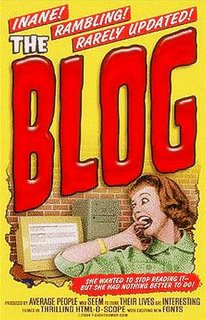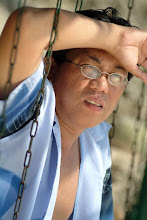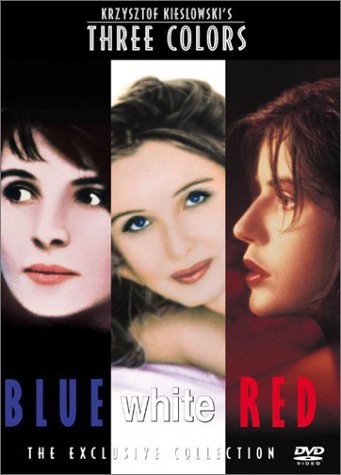 Kevin Ray Underwood, the repressed Oklahoma cannibal, kept an Internet "blog" of his compulsions for years before kidnapping and killing a 10-year-old neighbor last week. On his blog, Kevin wrote a lot about Kevin: "The reason for my lackluster social life is a severe case of social anxiety and depression. I'm on medication now, which helps a lot. Well, in ways."
Kevin Ray Underwood, the repressed Oklahoma cannibal, kept an Internet "blog" of his compulsions for years before kidnapping and killing a 10-year-old neighbor last week. On his blog, Kevin wrote a lot about Kevin: "The reason for my lackluster social life is a severe case of social anxiety and depression. I'm on medication now, which helps a lot. Well, in ways."I don't think the blogosphere is breeding cannibals. But it looks to me as if the world of blogs may be filling up with people who for the previous 200 millennia of human existence kept their weird thoughts more or less to themselves. Now, they don't have to. They've got the Web. Now they can share.
Technorati, a site that keeps numbers on the blogosphere, reports that as of this month the number of Web logs the site tracks is 35.3 million, and doubling every six months. Technorati claims each day brings 75,000 new blogs. We know something's happening here but I'm not sure we know what it is.
Typically, a blogger creates a Web site and then, in the pale glow of a PC screen, types onto a keyboard what's on his or her mind. A blog nearly always invites readers to share their "comments," which they do, and which the blogger posts seriatim. People in my business tend to think blogging is mostly about politics on sites such as Wonkette, the Huffington Post or the Daily Kos. There are highly intellectual blogs, such as the Becker-Posner Blog, run by Nobel economics laureate Gary Becker and federal judge Richard Posner. Their April 16 post is titled "Tax Complexity and the Cost of Compliance," with comments.

But in a "Blogs Trend Survey" released last September, America Online reported that only 8% blog to "expose political information." Instead, 50% of bloggers consider what they are doing to be therapy. Some might argue that using the Internet to self-medicate includes many nominally political blogs, but more on that shortly.
Not surprisingly, a new vocabulary has emerged from clinical psychology to describe generalized patterns of behavior on the virtual continent. As described by psychologist John Suler, there's dissociative anonymity (You don't know me); solipsistic introjection (It's all in my head); and dissociative imagination (It's just a game). This is all known as digital identity, and it sounds perfectly plausible to me.
A libertarian would say, quite correctly, that most of this is their problem, so who cares? But there is one more personality trait common to the blogosphere that, like crabgrass, may be spreading to touch and cover everything. It's called disinhibition. Briefly, disinhibition is what the world would look like if everyone behaved like Jerry Lewis or Paris Hilton or we all lived in South Park.
Example: The Web site currently famous for enabling and aggregating millions of personal blogs is called MySpace.com. If you opened its "blogs" page this week, the first thing you saw was a blogger's video of a guy swilling beer and sticking his middle finger through a car window. Right below that were two blogs by women in their underwear.
 In our time, it has generally been thought bad and unhealthy to "repress" inhibitions. Spend a few days inside the new world of personal blogs, however, and one might want to revisit the repression issue.
In our time, it has generally been thought bad and unhealthy to "repress" inhibitions. Spend a few days inside the new world of personal blogs, however, and one might want to revisit the repression issue.The human species has spent several hundred thousand years sorting through which emotions and marginal neuroses to keep under control and which to release. Now, with a keyboard, people overnight are "free" to unburden and unhinge themselves continuously and exponentially. One researcher quotes the entry-page of a teenage girl's blog: "You are now entering my world. My pain. My mind. My thoughts. My emotions. Enter with caution and an open mind."
The power of the Web is obvious and undeniable. We diminish it at our peril. But what if the most potent social effect to spread outward from the Internet turns out to be disinhibition, the breaking down of personal restraints and the endless elevation of oneself? It may be already.
Disinhibited vocabulary is now the normal way people talk on cable TV, such as on "The Sopranos" or in stand-up comedy. On the Web and on the street, more people than not talk like this now. What once was isolated is covering everything. No wonder the major non-cable networks are suing to overturn the FCC's decency rulings; they, too, want the full benefits of normalized disinhibition. Hip-hop, currently our most popular music form, is a well-defined world of disinhibition.
Then there's politics. On the Huffington Post yesterday, there were more than 600 "comments" on Karl Rove and the White House staff shake-up. "Demoted my --- the snake is still in the grass." "He should be demoted to Leavenworth." "Rove is Bush's Brain, and without him, our Decider-in-Chief wouldn't know how to wipe his own ----."

From a primary post on the same subject on the Daily Kos, widely regarded as one of the most influential blogging sites in Democratic politics now: "I don't give a ----. Karl Rove belongs in shackles." "A group of village whores have taken a day off to do laundry."
Intense language like this used to be confined to construction sites and corner bars. Now it is normal discourse on Web sites, the most popular forums for political discussion. Much of this is new. Politics is a social endeavor. The Web is nothing if not "social." But the blogosphere is also the product not of people meeting, but venting alone at a keyboard with all the uninhibited, bat-out-of-hell hyperbole of thinking, suggestion and expression that this new technology seems to release.
At the risk of enabling, does the Internet mean that all the rest of us are being made unwitting participants in the personal and political life of, um, crazy people? As populist psychiatry, maybe this is a good thing; the Web allows large numbers of people to contribute to others' therapy. It takes a village.
But researchers note that the isolation of Web life results in many missed social cues. It is similar to the experience of riding an indoor roller coaster, what is known in that industry as a "dark ride." This dark ride could be a very long one.

























































1 comment:
nice blog, tol. link rin kita.
Post a Comment